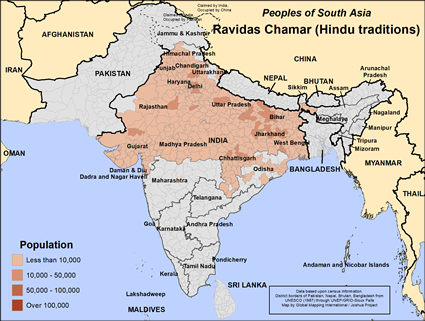Ravidas Chamar (Hindu traditions) in India

Photo Source:
Anonymous
|

Map Source:
People Group data: Omid. Map geography: UNESCO / GMI. Map Design: Joshua Project
|
| People Name: | Ravidas Chamar (Hindu traditions) |
| Country: | India |
| 10/40 Window: | Yes |
| Population: | 1,417,000 |
| World Population: | 1,417,000 |
| Primary Language: | Hindi |
| Primary Religion: | Hinduism |
| Christian Adherents: | 0.85 % |
| Evangelicals: | 0.00 % |
| Scripture: | Complete Bible |
| Ministry Resources: | Yes |
| Jesus Film: | Yes |
| Audio Recordings: | Yes |
| People Cluster: | South Asia Dalit - Chamar (Bhambi) |
| Affinity Bloc: | South Asian Peoples |
| Progress Level: |
|
Introduction / History
The Ravidas are part of a subgroup of Chamar who live in India. The Chamars represent the largest population of the low caste groups in the country. The Ravidas are a portion of the Chamars that revere the 15th century guru Ravidas. Their traditional occupation is that of leather worker, a profession, which is scorned by devout Hindus. The Ravidas make shoes, belts and other goods from dead cattle. They do no kill the animals, which would be against their Hindu beliefs. Some Ravidas have left their former occupation to weave bamboo into baskets and other useful items. Still others work as landless laborers on tea plantations and farms. Unfortunately, illiteracy is an issue for the Ravidas. Without a proper education, they have little opportunity to escape their lives of poverty and exclusion.
The Ravidas Chamar are designated a Scheduled caste by the Indian government. They are eligible for special preference for public jobs and in university admission.
The primary language of the Ravidas is Hindi. They also speak other regional Indian languages like Kangri and Gujarati.
Where Are they Located?
Most of the Ravidas Chamar lives in the north Indian state of Jharkand. The rest live across many areas of India like Uttar Pradesh, Himachal Pradesh and Madhya Pradesh.
What Are Their Lives Like?
The lives of the Ravidas Chamar, like the lives of all who are from a low caste, are challenging. They are excluded from many aspects of Indian life by their low class classification. The Indian Constitution outlaws the caste system, but it still ingrained in the hearts of the Hindus. Most Ravidas live in rural villages without the modern blessings of clean water, electricity and indoor plumbing.
The Ravidas marry within their caste. Their own priests lead important life ceremonies since Brahmins will not work with them. Families arrange marriages. Sons inherit property with the home going to the eldest son. The newly married Ravidas couple lives with or near the groom's parents.
The main foods of the Ravidas Chamar are rice, sorghum and seasonable vegetables and fruit. The Ravidas are not vegetarians but as Hindus will not eat beef.
What Are Their Beliefs?
The Ravidas Chamar practice Hinduism, the ancient religion of India. They worship and serve the gods of the Hindu pantheon. Their main gods are Vishnu, the preserver and Shiva, the destroyer. Hindus believe that by performing rituals and good works that they will attain moksha or freedom from the endless cycle of birth, death and rebirth. The Ravidas offer prayers, food, flowers and incense to their gods at their village shrines because people from low caste groups are often not allowed to enter standard Hindu temples.
The main yearly holidays of the Ravidas people are Holi, the festival of colors, Diwali, the festival of lights and Navratri, the celebration of autumn.
What Are Their Needs?
The Ravidas Chamar have pressing needs. They need help in getting an education for their children. They need help in bringing clean water, electricity and indoor plumbing to their villages. Most of all, they need to hear the life-changing message of Jesus Christ in a way they can understand.
Prayer Points
Pray that God sends Christian workers to share the gospel with and help with the physical needs of the Ravidas.
Pray for the Holy Spirit to give the Ravidas people a love for God's Word and a desire to spread its influence.
Pray that the tiny number of Ravidas Christians would be trained and that their numbers would increase as they share God's Word with their brothers and sisters.